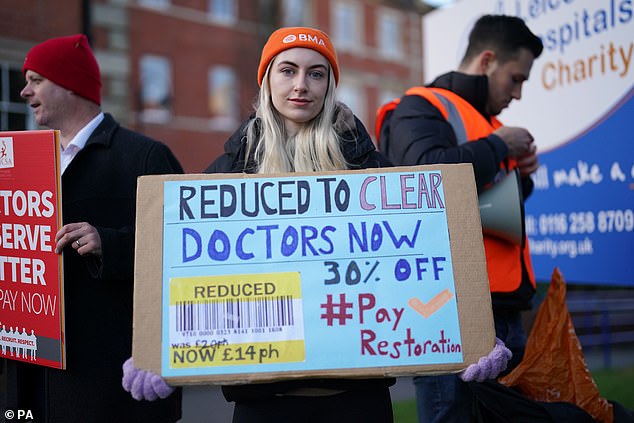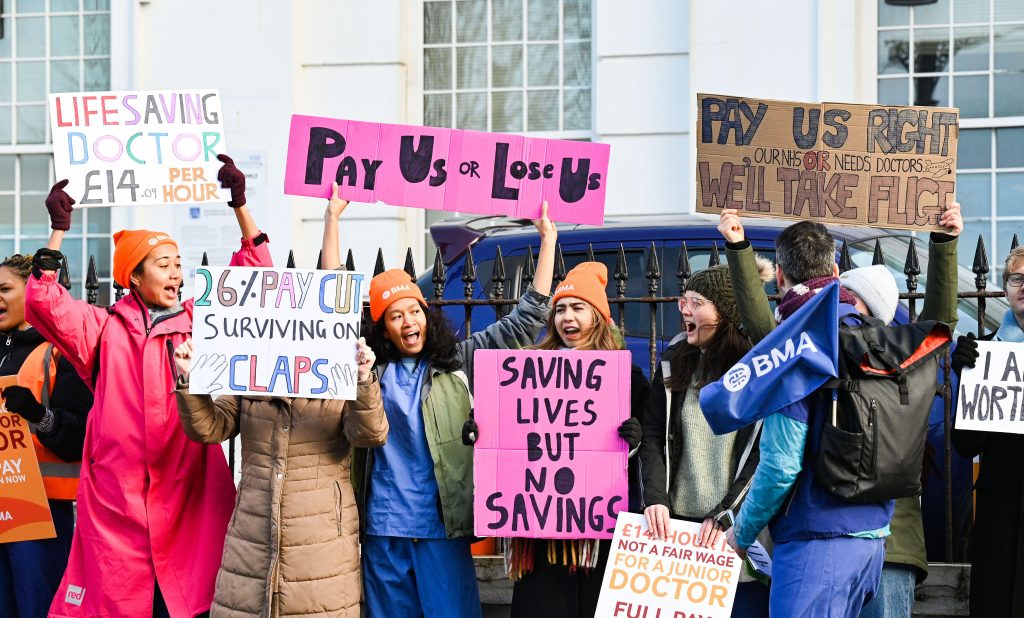
 |
||||
|---|---|---|---|---|
| Volume 53 Number 10, April 22, 2023 | ARCHIVE | HOME | JBCENTRE | SUBSCRIBE |

Junior doctors in England held a four-day strike from April 11-14. These doctors represent over 40% of medical professionals, including the newly qualified through to those with more than 10 years' experience.
An overwhelming 98% of British Medical Association (BMA) members backed strike action, on a turnout of 77%. The doctors are demanding a 35% pay rise due to 15 years of real-terms pay cuts. Junior doctors' inflation-adjusted pay has fallen by 26% since 2008, leading to a crisis in recruitment and retention, according to the BMA. Though the action covered all services, the BMA took action to protect patients, such as bringing junior doctors off picket lines where hospitals reported lives were in immediate danger.

Leading up to the strike, the NHS Confederation, which represents health service trusts, estimated that the strike could affect the timing of up to a quarter of a million operations and appointments. The NHS stated its intent to prioritise resources to protect emergency treatment, critical care, maternity and neonatal care, and trauma.
The BMA is asking for a credible offer from Health Secretary Steve Barclay to start negotiations to address the real terms pay cut.
"All we're asking for is a credible offer that shows us he's serious," said Vivek Trivedi, co-director of the BMA Junior Doctors' Committee. Likewise, Deputy Chair of the Committee Dr Mike Greenhalgh said that "it's hard to negotiate when only one side is doing it."
Treating the junior doctors' just demands with contempt, Barclay branded them "unrealistic". But he is the one who needs a dose of reality. The cuts will not solve the problems of a health service that cannot recruit. The demands are as realistic as much as they are essential. Barclay's huckstering flies in the face of what is necessary to uphold the future of the NHS and the fact that the society demands that doctors and health professionals are in place and working. Without recruitment of doctors, there is no credible health service, society cannot function, and society would face an existential crisis. Without a health service, no modern political or social system can function properly. The demand will come back time and time again if such issues of human and social relations are not resolved.

Brighton - Photo Simon Dack, Alamy Live
News
Yet Barclay simply stated that he wanted to "see a fair deal that increases their pay" but could see "no prospect of getting into serious and constructive talks" unless the strike action was cancelled, and the BMA changed its demands. Not to listen to the demands of junior doctors is an affront against which the workers have already declared "Enough is Enough!". Turning truth on its head, Barclay is trying to give the impression that by striking and taking a militant stance, the junior doctors are hampering negotiation. The opposite is the case. Negotiation can continue with or without ongoing action, and negotiation can only be meaningful if the doctors uphold their own dignity, which is exactly what their action reinforces.
Barclay asserted that the doctors' pay demands were "out of step with pay settlements in other parts of the public sector". This comparison is ridiculous and takes account neither of the objective criteria used to value labour and its reproduction, nor of the monopoly-dominated market forces that set the context to the setting of prices and incomes.
It is the government that has made an arbitrary "offer", which is the real pie in the sky. The government's miscalculation is based on the view that there is a limited national cake, a conception which serves to deprive people of an outlook. The size of the so-called cake is itself obscured, as are the means over cutting it, and the issue of who decides. Rather than some static national cake, there is accumulation of wealth by capital at one pole and impoverishment of the people at the other, commonly known as the wealth gap. This is what "affordability" means. To use words like "unrealistic" and "affordability" is an attempt to block the health workers from their own independent outlook, and to bind them to the outlook of the government.

A healthy society needs a modern public health service with adequate all-round funding, investment and justly paid health workers and professionals. However, the situation has developed where poor pay and lack of investment have caused a huge skill shortage, leading to many junior doctors moving abroad or leaving the profession. Squeezing doctors' and nurses' standards of life and work has become the norm. With poor pay, the dignity of labour is placed under the cudgel, causing the labour resource to diminish and the valuable social programme that is the NHS to deteriorate. Today, the huge skill shortage is shrinking the productive capacity and labour, a shortage caused by lack of investment in training and low pay over many years. At some point, strike, or no strike, if there is to be a credible health service then the rate for the job must be met, regardless of the wishes of anybody. It matters not whether it is 35% or any other figure: if that is the requirement to ensure the productive resource for the NHS, then the figure stands, "affordability" or not. The question is whether a credible health service can be sustained without such a figure to maintain recruitment and pay the junior doctors their worth.
At the same time, the government resorts to prevention of organised opposition - including anti-strike laws - as a method of coercion whereby the police powers of the state are made available in an attempt to resolve the issue without taking the interests of the workforce into account. The workers' dignity stands in direct opposition to the privileged elite.
The arbitrary nature of government does not wish to concede any ground to any challenge to its rule. It does not wish to recognise the voice of the workers, give any space to the independent outlook of the working class, or come to any agreement with workers' organisations in civil society such as trade unions. The gatekeepers of governance are intent to hold the doors to decision-making power closed, with total disregard for and placing themselves above human relations. In contrast, empowerment for workers across the board is on the agenda, and the movement of health workers and the people as a whole is gathering pace to turn the tables on the government and ruling elite. The situation demands that health workers and people participate in the decision-making required to protect and develop the publicly-owned healthcare system.